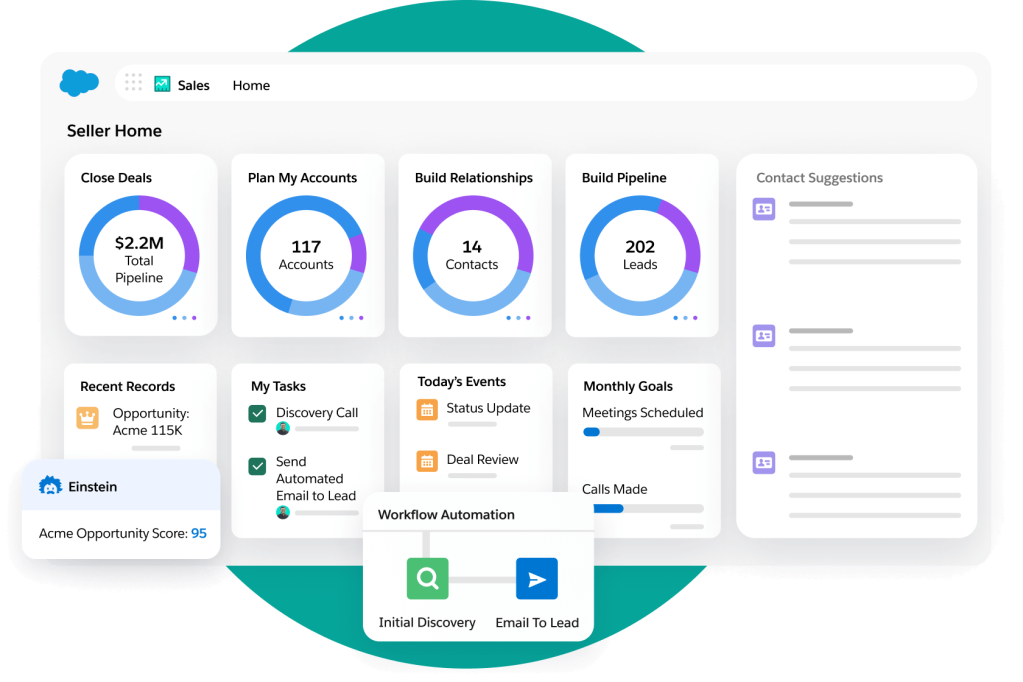

How Sales Management is Handled within Sales Cloud?
Sales Cloud is Salesforce’s powerful CRM platform is designed specifically for sales teams.
How sales management is handled within Sales Cloud, Salesforce’s powerful CRM platform designed specifically for sales teams. Sales Cloud provides a comprehensive suite of tools and features to streamline sales processes, enhance productivity, and drive revenue growth. Here are the key aspects of sales management in Sales Cloud:
1. Lead Management:
- Lead Capture: Sales Cloud allows you to capture leads from various sources, such as web forms, social media, and email campaigns.
- Lead Scoring: Assign scores to leads based on their potential, behavior, and fit with your ideal customer profile.
- Lead Assignment: Automatically route leads to the right sales reps based on predefined rules or territories.
2. Opportunity Management:
- Pipeline Tracking: Manage opportunities through the sales pipeline. Sales Cloud provides a visual representation of deals at different stages.
- Deal Insights: Leverage AI-powered insights to understand deal health, identify risks, and prioritize follow-ups.
- Sales Forecasting: Accurately forecast revenues by analyzing historical data and current pipeline1.
3. Account Management:
- 360-Degree View: Sales Cloud consolidates account information, including contacts, interactions, and historical data.
- Account-Based Selling: Tailor your approach based on the specific needs of each account.
- Account Planning: Collaborate with your team to create account strategies and action plans.
4. Territory Management:
- Territory Definition: Define territories based on geography, industry, or other criteria.
- Territory Assignment: Assign accounts and opportunities to sales reps based on their territories.
- Balancing Workloads: Ensure equitable distribution of accounts and opportunities among team members.
5. Sales Process Automation:
- Workflow Rules: Automate repetitive tasks, approvals, and notifications.
- Process Builder: Create custom processes with drag-and-drop simplicity.
- Approval Processes: Define approval workflows for pricing, discounts, and contract approvals.
6. Quoting and Contracting:
- Quote Generation: Create professional quotes directly within Sales Cloud.
- Contract Management: Track contract lifecycles, renewals, and amendments.
- E-Signatures: Integrate with e-signature solutions for seamless contract execution.
7. Reporting and Dashboards:
- Custom Reports: Build reports to analyze sales performance, pipeline health, and conversion rates.
- Dashboards: Visualize data with real-time dashboards for quick insights.
- Forecast Reports: Monitor sales forecasts and adjust strategies as needed.
8. Collaboration and Mobility:
- Chatter: Sales Cloud’s collaboration tool allows sales reps to communicate, share updates, and collaborate within the platform.
- Mobile App: Access Sales Cloud on the go via the mobile app for real-time updates and responsiveness.
In summary, Sales Cloud empowers sales teams to manage leads, opportunities, accounts, and territories effectively. By leveraging automation, insights, and collaboration features, organizations can optimize their sales processes and achieve sustainable growth
